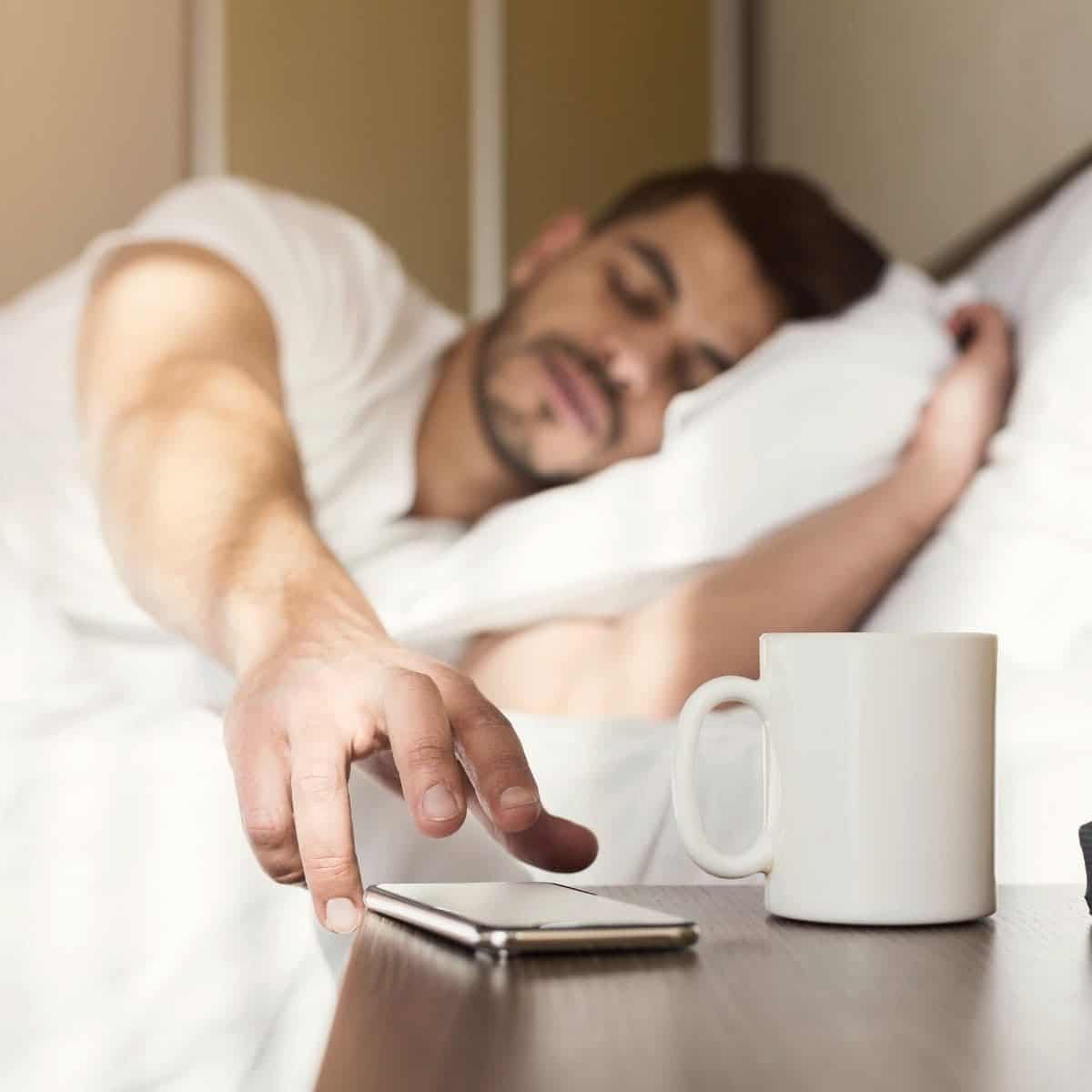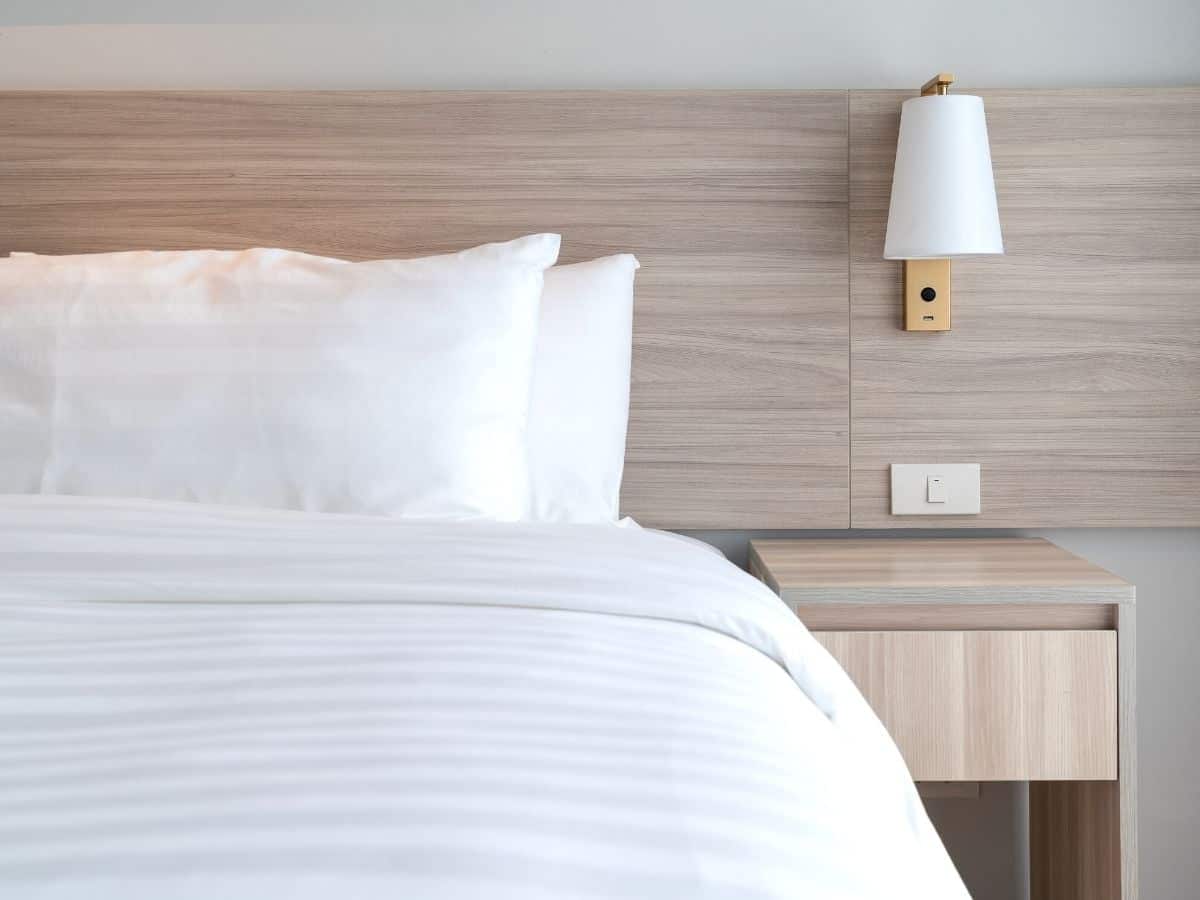Learn how to wake up early feeling energized and excited without hitting snooze. The key is to push your wake-up time back gradually.

Disclaimer
The information on this page isn’t a substitute for professional medical advice. If you experience insomnia, constant sleepiness, difficulty waking up, or sleep loss, talk to your healthcare provider.
Waking up earlier has many benefits. It can make you more productive, give you time to take it easy in the morning, and start your day off on the right foot.
Related: Morning routine ideas for success
Another benefit is that you’ll likely feel sleepy earlier, which can help you get a good night’s sleep and feel well-rested.
Now, if you have trouble waking up or feel tired every morning, it’s a sign that you’re not getting enough rest.
Related: 5 ways to improve your self-discipline
Of course, the goal is to get 7 to 9 hours of sleep. If you’re already doing this and still have trouble getting up, the following are tips to help you wake up early.
Some ideas are tried and true, while others may be unconventional. Try out the different tips to see what works best for you.
Related: 21 confidence quotes to help you believe in yourself
Table of Contents
1. Gradually change your sleep schedule

To consistently wake up early and ensure it becomes routine, make the changes gradually.
If you drastically change your sleep schedule, you may feel tired, and it can be difficult to maintain.
Related: How to believe in yourself
Instead of setting your alarm for an hour or two earlier, start by waking up 15 to 30 minutes earlier every day.
Continue waking up slightly earlier until you reach your desired wake-up time. The slow and steady change will help your body adapt.
It’ll be easier than shocking your body with a drastic change. Plus, it can help you stay consistent and wake up early without feeling much of a difference in your energy levels.
With waking up earlier, do your best to sleep earlier, too. The U.S. Department of Health and Human Services recommends that adults get 7 to 9 hours of sleep.
Once you’re able to get a full night’s rest and wake up early, focus on consistency. Make sleep a priority.
2. Have a bedtime routine
There’s a saying that your day starts the night before. Set yourself up for success by having a bedtime routine.
If you’ve tried getting into bed earlier, you may already know that it’s not that easy to fall asleep. Chances are, you find yourself laying there for a while before dozing off.
That’s where a bedtime routine comes in. It allows you to wind down and prepare you to sleep well.
A personalized bedtime routine ensures that you stay consistent and improves your sleep quality. The following are ideas of things that you can do:
- Take a warm bath.
- Read a book.
- Listen to soft and soothing sounds.
- Dim the lights.
- Turn off the TV and put away your electronics.
- Drink caffeine-free tea.
- Do relaxation yoga, stretch, or meditate.
Regardless of what your bedtime routine consists of, do things that make you feel relaxed.
Avoid activities that energize you or increase your heart rate.
By following a relaxation-focused bedtime routine, you’ll be able to go to bed sleepy and wake up well-rested. It makes waking up easier.
3. Drink water first thing in the morning

Before you go to bed, fill up a cup or water bottle with water. Then, place it on your bedside table or somewhere easily accessible.
Whether you wake up naturally or use an alarm, chug water right when you wake up.
After sleeping for hours, you’re dehydrated. Get rejuvenated by hydrating. It’ll help you feel energized and awake.
According to a study by Nutrients, drinking water upon waking up also promotes adequate hydration throughout the day. Whatever your water intake goal is, you’ll get started early in the day.
Another benefit of drinking water right when you wake up is if you hit the snooze button and go back to sleep, you’ll wake up because you need to go to the bathroom.
4. Place your alarm out of reach
If you rely on an alarm to wake you up but have a habit of hitting the snooze button, relocate it.
Find a new spot to place your alarm and make sure it’s out of reach. The ideal location will force you to get out of bed to turn it off.
By getting out of bed, you’re more likely to stay up and start your day instead of going back to sleep.
When you move your alarm, make sure it’s loud enough. You need to be able to hear it while you’re in bed.
5. Eat at least 2 hours before going to sleep

If you’re hungry and need a snack before bed, eat something light, like nuts or yogurt.
Going to sleep hungry can make it more difficult to fall asleep. It can lead to being tired in the morning.
When it comes to large meals and spicy foods, eat them at least 2 to 3 hours before going to sleep.
It’ll give your body time to digest the food and feel good before going to bed.
6. Have a cut-off time for caffeine
Whether you drink coffee, tea, or energy drinks, have a cut-off time. While caffeine may give you a boost of energy, don’t let it ruin your sleep quality because it’ll be difficult to wake up.
According to the Journal of Clinical Sleep Medicine, it’s best to stop your caffeine intake at least 6 hours before bedtime.
At 6 hours before sleeping, the study showed that caffeine led to an hour of disrupted sleep.
For example, if you go to sleep at 10 PM, finish your last sip of coffee by 4 PM at the latest.
By having an earlier cut-off time for caffeine, you can go to sleep and wake up feeling well-rested.
7. Make your bed and get out of the room

Once you wake up and drink your water, make your bed, and get out of the bedroom.
Being in the bedroom is tempting because you’re looking at your bed and how comfortable it is. You can quickly find yourself laying in bed and falling back asleep.
By making your bed, you’re accomplishing the first task of the day. Plus, you’re less likely to get back into bed because of how nice it looks.
So, make your bed and leave the bedroom. Continue with your morning routine and prepare for an amazing day.
8. Start your day with light and fresh air

According to the National Sleep Foundation, light is what tells your body that it’s daytime. It helps you become alert, awake, and active.
It’s known as your circadian rhythm, which is your body’s internal clock. While temperature and activity levels impact it, light is a part of the day and night cycle.
Aside from telling your body that it’s daytime, the light can boost your mood.
In addition to light, get fresh air. Step outside or open a window.
Breathing in the fresh air and absorbing the morning light can help you stay awake and feel energized.
Right when you wake up, open the curtains and windows.
9. Have a motivation
If you don’t need or have the desire to wake up early, why would you? However, if waking up earlier is your goal, you must understand your motivation.
Why do you want to wake up early? Why do you need to?
By having a good understanding of your reason, you can be consistent, remember it when you wake up, and ensure it becomes a long-term habit.
There are many beneficial reasons to wake up early. You can implement new things into your day, have a peaceful morning, and get a head start.
Your motivation can be as big or small as you want. The purpose is to make sure it’s a strong enough reason to get you out of bed on the days where you don’t feel like getting up.
10. Get a pet

If you’re able and want to, get a pet. Not only are pets fun and cute companions, but they’re also excellent at getting you out of bed.
Often, cats will knead your face or walk all over you in the morning.
Dogs may also jump on your bed and hang out. Plus, your dog needs to get out in the morning to do its business.
The great thing about a pet is that it’ll keep you accountable. Whether you want to get up or not, a dog or cat can wake you up early.
Conclusion
It’s possible to wake up early and feel energized. By implementing the tips mentioned, you can start waking up earlier and feel well-rested.
Remember, consistency is the key. If you hit snooze, forgive yourself, keep moving forward, and try again the next day. Over time, it’ll become natural.
Featured image courtesy of Canva.
